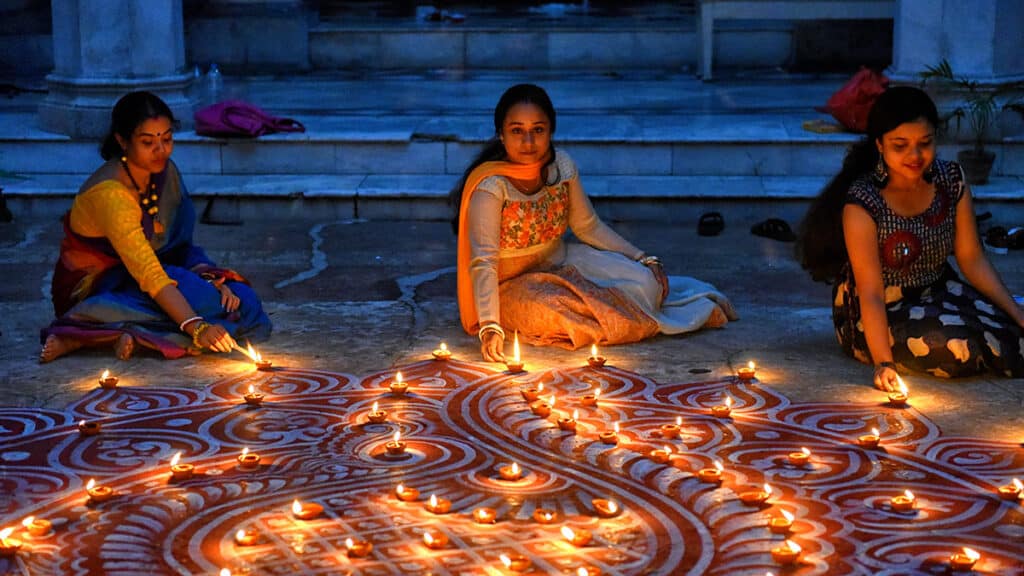
Diwali NYC, the South Asian and West Indian festival of lights, is a five-day festival that celebrates the triumph of light over darkness, good over evil, and knowledge over ignorance.
Diwali NYC 2024
Diwali on the Hudson is a Diwali party by the Desai Foundation; at HK Hall in Hell’s Kitchen, Manhattan; on Thursday, October 17, 2024. givesmart.com 🪔
Times Square started celebrating Diwali in 2013. Diwali at Times Square is on Broadway, between 46th-48th St, in Manhattan’s Times Square Theater District; on Saturday, October 19, 2024, from 11am – 8pm. FREE. diwalitimessquare.com 🪔
One World Trade Center will be lit in Diwali colors; in Manhattan’s Financial District; on Wednesday, October 30, 2024. 🪔
Diwali is now an official New York City holiday. NYC Public Schools are closed for Diwali on Friday, November 1, 2024. 🪔
Diwali Celebration at the Seaport Museum offers diya lighting, Diwali Puppet Storytime, “A Kids Book About Diwali” reading, an interactive dance workshop, and more on the 1885 tall ship Wavertree in Seaport, Manhattan; on Friday, November 1, 2024, from 11am – 6pm. Free with rsvp. southstreetseaportmuseum.org 🪔
Flushing Town Hall’s 10th Annual Diwali Festival features family workshops on block printing, rangoli making (patterns drawn with ground rice), Indian cooking, henna tattoos, and Hindi calligraphy; plus a ance performance of “Navadurga” about the female divine by Abha Roy, Srijan Dance Company, ADDA, and Dr. Santa R Nandi; plus a dance party with DJ Rekha; and Indian food for sale; at Flushing Town Hall in Flushing, Queens; on Saturday, November 2, 2024, from 12-4pm. $20/children free. flushingtownhall.org 🪔
Light Up Liberty Avenue is a parade of cars decorated with lights produced by the Divya Jyoti Association of New York; at Liberty Avenue and Lefferts Blvd, in Little Guyana, South Ozone Park, Queens; on Saturday, November 2, 2024, from 3-8pm. diwalimotorcade.com 🪔
There are also Diwali celebrates at various branches of the New York Public Library. nypl.org
Diwali
Diwali falls on the 15th day of Kartik, the holiest month in the Hindu lunar calendar. The date varies every year with the cycles of the moon.
In South Asia
The tradition is celebrated in Hindu, Buddhist, Jain and Sikh communities of South Asia and the Diaspora. It is a national holiday in many countries, including Afghanistan, Bangladesh, Bhutan, India, Maldives, Nepal, Pakistan, and Sri Lanka. Many of these communities are growing in New York City.
In the West Indies
Diwali is Latin through the Caribbean, which is far more diverse than most of us understand. Caribbean countries went through layers of colonization. After abolition, British colonizers brought over half a million indentured servants from South Asia to work on sugar cane plantations, especially in the West Indies (Lesser Antilles).
Today Indo-Caribbeans are a plurality (the largest group, but not a majority) in Trinidad and Tobago, Guyana and Suriname. There is also a large Indo-Caribbean community in Jamaica. This is why we have good curry at New York Carnival and the West Indian Day Parade, which are based on Trinidadian traditions.
What is Diwali About?
The big idea is the “victory of light over darkness, good over evil and knowledge over ignorance.” It’s also Hindu New Year, so that may be celebrated as well.
The festival normally lasts four or five days. Each day has a different focus.
- On Day 1, we clean our homes and shop for things that represent good fortune.
- On Day 2, we decorate with clay lamps and “rangoli” patterns drawn on the floor with colored powders, sand, rice, or flower petals.
- Day 3 is basically New Year’s Eve. Families gather for a feast, fireworks and Lakshmi puja prayers to Lakshmi, the goddess of wealth.
- Day 4 is the start of the new year. We exchange gifts.
- Day 5 is a day when brothers share a meal with their married sisters.
The ritual of lamp lighting is very human. It symbolizes our inner light, because the solution to our problems is not outside, it’s inside of us. The smoke rising in the air symbolizes letting go of the past, and hope for a brighter future.
When you step back and think about it, many different cultures around the world have similar celebrations. There is something about being human that leads us all to do similar things.
